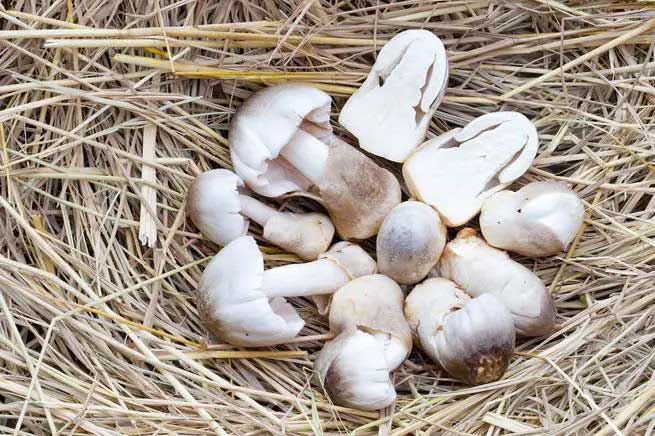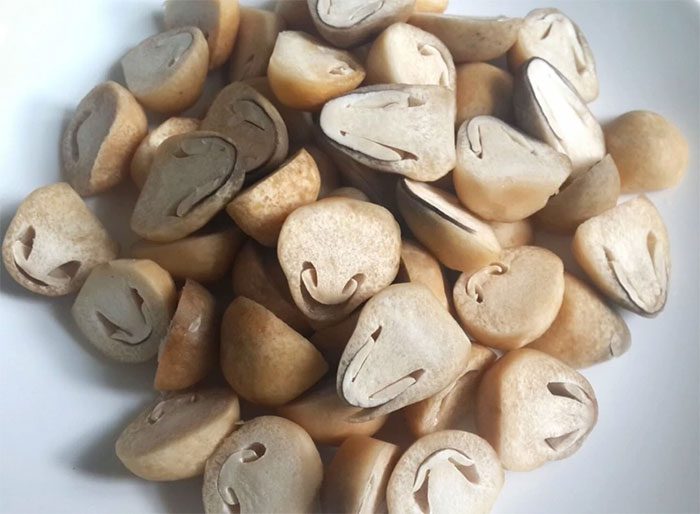Straw mushrooms are rich in carbohydrates, protein, fiber, minerals, and vitamins. The protein content in mushrooms is high and nutritious, especially straw mushrooms, which contain 8 types of amino acids in higher amounts than meat, fish, vegetables, or citrus fruits.
Things to Know When Eating Straw Mushrooms
The scientific name of straw mushrooms is Volvariella volvacea. This type of mushroom is characterized by its small size, soft texture, and unique flavor. Straw mushrooms are rich in vitamins and fiber, containing no cholesterol, thus offering numerous health benefits.
1. Nutritional Value of Straw Mushrooms
According to Healthbenefitstimes, 182g of straw mushrooms contain:
- Protein: 6.97 grams
- Water: 163.58g
- Total fat (lipid): 1.24g
- Carbohydrates: 8.44 grams
- Total fiber: 4.5g
- Calcium: 18 mg
- Iron: 2.6 mg
- Magnesium: 13 mg
- Phosphorus: 111 mg
- Potassium: 142 mg
- Sodium: 699 mg
- Zinc: 1.22 mg
- Copper: 0.242 mg
- Manganese: 0.178 mg
- Selenium: 27.7 µg
- Vitamin B1 (Thiamine): 0.024 mg
- Vitamin B2 (Riboflavin): 0.127 mg
- Vitamin B3 (Niacin): 0.408 mg
- Vitamin B5 (Pantothenic Acid): 0.75 mg
- Vitamin B6 (Pyridoxine): 0.025 mg
- Vitamin B9 (Folate): 69 µg
- Folate: 69 µg

Straw mushrooms contain 8 types of amino acids in higher amounts than meat, fish, vegetables, or citrus fruits. (Image: Internet).
2. Health Benefits of Straw Mushrooms
Like other types of mushrooms, straw mushrooms are highly nutritious and beneficial for health due to their rich nutritional value.
Enhances Endurance
Straw mushrooms contain ergothioneine, a powerful antioxidant that protects the body against free radicals. This antioxidant content helps reduce fungal infections, bacterial growth, and promotes wound healing. Additionally, the high protein content and low carbohydrate levels in straw mushrooms can support endurance, making them a valuable food in athletes’ diets.
Helps Reduce Cholesterol Levels
Straw mushrooms contain phenolic acid, an antioxidant that inhibits lipid peroxidation, helping to reduce blood cholesterol, low-density lipoprotein (LDL) cholesterol, and triglyceride levels. By incorporating straw mushrooms into your diet, you can support cardiovascular health and lower the risk of heart disease.
Prevents the Growth of Cancer Cells
Recent studies show that straw mushrooms contain beta-D-glucan and lectin. These compounds have the ability to inhibit the growth and proliferation of various tumor cells, including malignant tumors, colorectal cancer, and leukemia.

Straw mushrooms contain beta-D-glucan and lectin – compounds capable of inhibiting the growth and proliferation of cancer cells. (Image: Internet).
Helps Control Blood Pressure
Straw mushrooms are a rich source of naturally active compounds that help lower blood pressure and prevent hypertension. Regular consumption of these mushrooms can help manage blood pressure levels and reduce the risk of cardiovascular disease.
Supports Diabetes Management
Straw mushrooms contain polysaccharides, β-glucans, lectins, lactones, terpenoids, alkaloids, sterols, and phenolics. These substances can restore pancreatic cell function to increase insulin output, thereby lowering blood sugar levels and improving glucose tolerance.
Regulates Immunity
Straw mushrooms contain a type of protein called Fip-vvo, which has immunomodulatory properties and protects against various chronic diseases. Furthermore, the lectins found in straw mushrooms also possess immunomodulatory activity.
Immunoregulation may hold potential for controlling certain infections, autoimmune diseases, transplant rejections, as well as cancers.
Rich in Antioxidants
Straw mushrooms contain a significant amount of antioxidants such as glutathione, lycopene, phenolics, flavonoids, carotenoids, vitamins (A and C), and ascorbic acid. These antioxidants can protect cells from damage caused by free radicals.

Antioxidants in straw mushrooms can protect cells from damage caused by free radicals. (Image: Internet).
Has Antibacterial Properties
This type of mushroom is a rich source of tannins, flavonoids, triterpenoids, anthraquinones, and alkaloids that combat various bacteria such as Staphylococcus aureus, Klebsiella pneumonia, Pseudomonas aeruginosa, and Streptococcus pyogenes.
Good for Bones
Like other edible mushrooms, straw mushrooms are high in calcium and vitamin D. Therefore, incorporating these mushrooms into your diet is beneficial for bone development and can help prevent conditions such as osteoporosis.
3. Health Risks of Eating Straw Mushrooms
Straw mushrooms are rich in nutritional value and safe for most people, but they can still pose some health risks:
Allergic Reactions
Like any other food, some individuals may have allergic reactions when consuming straw mushrooms. Symptoms may include itching, swelling, or difficulty breathing. If you are allergic to mushrooms or other types of fungi, it is advisable to exercise caution before adding straw mushrooms to your diet.
Digestive Issues
Consuming raw or undercooked straw mushrooms, or eating too many, can cause digestive issues such as bloating, gas, and stomach discomfort. To avoid these problems, you should cook straw mushrooms and consume them in moderation.
Heavy Metal Contamination
This type of mushroom can accumulate heavy metals such as arsenic due to absorption from contaminated substrates, such as straw, water sources, etc. Consuming foods containing arsenic and having high levels of heavy metals in the body can increase the risk of heart disease, kidney disease, brain disorders, and diabetes.
4. Tips for Choosing Straw Mushrooms
When selecting straw mushrooms, consider the following points to ensure you purchase fresh and safe mushrooms:
- Check the color: Fresh straw mushrooms typically have a white or slightly yellow color. Avoid mushrooms with gray or discolored appearances, as this may indicate they have spoiled or been stored for too long.
- Feel the texture: Choose mushrooms that are firm to the touch and have good elasticity. If the mushrooms feel mushy or wet, do not buy them.
- Smell: Fresh mushrooms usually have a pleasant, distinctive smell, not strong or foul. If the mushrooms have an unusual or unpleasant odor, do not use them.
- Check the stem: The stem of the mushroom should not be too large compared to the cap, as this indicates the mushroom has grown too large and may have lost its flavor.
- Moisture: The mushrooms should not be too dry or show signs of wilting, as this also affects the quality and flavor of the mushrooms.
- Packaging and origin: If purchasing packaged mushrooms, pay attention to the production and expiration dates on the packaging. Additionally, choose mushrooms from reputable sources to ensure quality.
- Avoid damaged mushrooms: This not only affects appearance but also reduces the quality of the mushrooms, making them prone to spoilage and loss of flavor.
- Storage environment: Straw mushrooms should be stored in a cool environment, away from direct sunlight and high temperatures.


















































